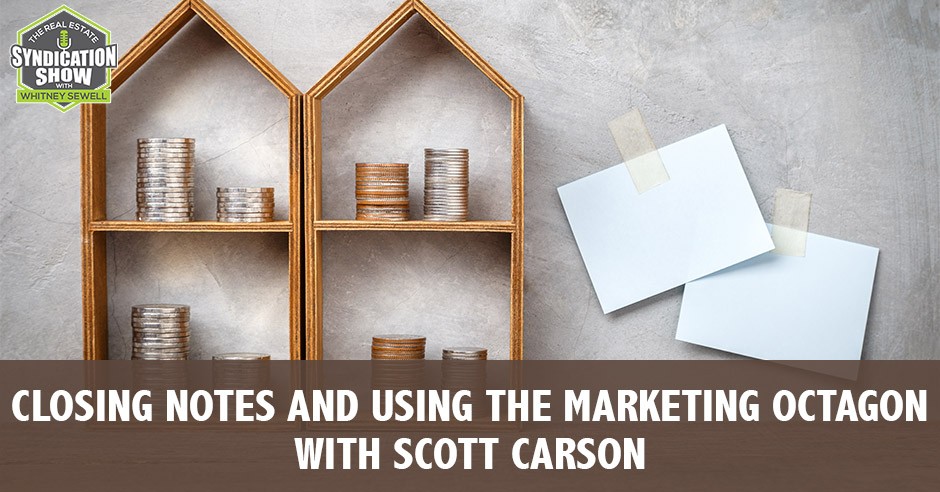
Listen to the podcast here:
—
Watch the episode here:
Closing Notes And Using The Marketing Octagon with Scott Carson
Our guest is Scott Carson. Thanks for being on the show, Scott.
Whitney, I am honored to be here. Kudos to you for doing this show. There are only a few of us that are doing those things out there. We either got to be brilliant or crazy. I’m honored to be here and I’m glad if I have any type of nuggets or knowledge that I can help with your amazing audience.
Scott is also known as the Note Guy. He’s been an active real estate investor since 2002. He solely focused on the distressed mortgage and note industries since 2008. He buys and sells nonperforming mortgages directly from banks and hedge funds on properties all across the country. He’s the CEO of WeCloseNotes.com, an Austin, Texas-based real estate firm. He purchased over $500 million in distress debt for his own portfolio. He purchases assets in over 30 states across the United States while also helping thousands of other real estate investors make money along the way. He’s been featured in Investor’s Business Daily, The Wall Street Journal and Inc.com. He’s also the host of the popular podcast, the Note Closers Show. Scott, thank you so much for your time being on the show. Give the audience a little bit more about who you are and let’s dive into this thing you called notes whatever that is.
I’m this crazy guy in Austin, Texas. I’m a previous mortgage broker and financial advisor. I did that for years after I graduated from college in the finance industry. In 2009, late 2008, I started a mortgage company and was traveling the country teaching real estate investors about creative finance and putting them in good mortgage products for their cash out refi. When all the music stopped in late 2008, 2009, I was smart enough to see the writings on the wall. I had a couple of mentors of mine and private lenders that were giving me money for my fix and flip deals here in Austin and the surrounding communities that had made a lot of their money in the ‘80s during the Resolution Trust Corporation, the RTC days. I’m like, “If you want to make some wealth of yours, here’s an opportunity.” I left the mortgage business and jumped in on the other side of buying distress debt or as I call it the naughty notes where the borrowers are being bad and not paying on time.
We buy that debt at a pretty substantial discount on either a one-off basis or in larger portfolios. Our normal trade is somewhere between $250,000 and $500,000 depending on where we’re buying. I love the business. I’ve been doing it over a decade. You can find a ton of my videos online, YouTube, Vimeo. We have 1,000-plus on there of different nuggets. The note business is a little bit different. Syndication business is different than going out and buying a fix and flip. There are some intricacies to it. It’s the same thing in the note business. I love what I do because we find a lot of deals direct to the banks and hedge funds where others aren’t looking. We often get some nice discounts and substantial deals. We’re buying it at 50% of value or less. The third thing, pricing and sourcing, there are a lot of strategies that we can use to make money on this. When we’re buying an asset and then we’d become the bank. Our biggest goal is a different mentality. Our goal is to rehab the borrower versus rehabbing the property.
Elaborate on that a little bit. Rehabbing the borrower, what does that mean?
We like to target owner-occupied assets. I know that may seem a little bit different than your traditional investors out there who want to take the property and fix it up, put some paint and carpet, lipstick on a pig and then resell it. That’s not my goal. The biggest institutions in the country are the banks. They’re not going out and fixing the flipping property. They’re creating loans and servicing these loans for cashflow. That’s what we want is to buy this debt at a discount. I usually only buy owner-occupied or occupied assets. That way, I could ensure most of the time that it’s in pretty good shape inside. The carpet gobblers haven’t showed up. The air conditioner hasn’t gone on a walkabout. It’s in pretty decent condition. It may not be something that I live in but that borrower who’s on the mortgage is happy living in it and then keeping the property up for the most part. When we bought it at a discount, we reach out to the homeowners or my vendors and staff too.
Our goal is like, “What happened? What’s your Country Western song? Did your dog die? Did your truck break down? Did grandma get run over by a reindeer? What’s the situation? I don’t care what happened. What are you doing? Are you working? Can you start paying on time now? Yes or no? If no, can you pay something?” The fact that we buy this debt at a discount gives us a lot of flexibility on our side to work with the homeowners and the borrowers to keep the house. Because if I do have to foreclose, now I’m forking out money for attorney fees and repair costs. Instead of getting it reperforming in 30 days, now I’ve got six months to a year before I can do anything with it. It’s always my best interest to keep them in that property. They’re going to take care of it for the most part. If I’m going to reperform it, now I’ve got cashflow coming in six to twelve months. Now I’ve got a reperforming asset that I can either keep for cashflow or sell off at a nice chunk of profit on the backend.
Tell me how is the note business similar to multifamily syndication?
It’s all about doors. That’s the thing. In multifamily syndication, you’re looking at property, you’re looking at doors, you’re figuring out your NOI and your cap rates. The reason you’re buying in bulk is your cost per door goes down. It’s a lot of the same way in the note business. We buy someone off on occasion if it makes sense. For the most part, I could have a bigger discount because I’m buying in bulk. I’m not the guy going out unclogging the toilets. I’ve got a vendor or attorney or property managers like servicers that are handling the phone calls. They’re handling and getting the borrowers to reperform or rehabbing the borrowers, “Let’s work out something that makes sense.” My least favorite thing is taking a property back because then I have to put more work into it and find an agent to sell it. It’s all about doors.

It’s why we’re able to have a couple of hundred doors on our portfolio. We’re constantly buying and selling. The idea is like in syndicating property, you buy something, you put a little spit and polish on it. In a couple of years, you sell it at a higher value because you bought it at a discount. It’s a win-win not only for yourself but also for your investors out there that have backed you on what you’re doing. There are a lot of similarities. We have a lot of students who have come over from the apartment side that were looking for deals. They cannot find anything there. They got money to put to work. They put together buying a couple of doors, three to twenty and work their way up by growing their portfolio that way.
Why notes over buying apartment complex?
It’s all about pricing. You’re able to do this business from anywhere. I got back from three and a half weeks in Europe and business ran fine. We’ve got a couple of deals that modified while I was traveling, a couple of deals that foreclosed out and sold in there. I want to go with the deal sources. When I first got into the note business, I cut my teeth mostly on multifamily notes at the time. I was buying from Capital One and Wells Fargo for multifamily and Plancorp who was handling a lot of stuff for other banks. I was buying 20 to 30, 300-unit apartment complex mortgages at substantial discounts and then working with the onsite management to get them back up and running on time and then having them refinance me out a few years later.
As the market has gotten more competitive over the years, everybody loves apartments. I simply say, “Let me go where the cheaper pricing is,” and I’ll be sitting well so that when the market does turn south again, I’ll jump back in and buying some of that mortgage debt on those apartments at steeper discounts. I’ll be able to work out something with either the owner-operators or take the property back and then become the owner operator that way. I’ve had that happened a few times where we took the apartment back. The bank that was going to buy the note from decided to go ahead and carry the paper for us as the operator, which is pretty nice.
To have purchased over $500 million in distress debt, I would imagine you’re working with a few investors. Tell me about the different types of questions that you may experience and how you answer them. That’s a big part of our job in syndication businesses, investor relations. It’s important that we’re doing it well. It’s important that we can answer questions. What’s the difference in the type of questions that you may get from investors when you’re raising capital?
[bctt tweet=”People don’t share enough about the successes that they have.” username=””]
Why a note? Why would the bank sell a note at a discount? Why wouldn’t they just take the property back? It’s the first question we get. The reason I tell them is the banks aren’t in the property management company. They want to own the debt. That’s why it’s a better way for us. It’s also a better way for them because with then a wire they can transfer the distressed asset off their books and now we have the bank. We have a lot of flexibility that we can do with the bank. We’ve got a lot of different exit strategies that we can do. It may go a different way. We may get it reinstated. We may get it modified. We may take the property back. We may pay the borrower to take the property back. We may sell the asset off of doing a little bit of work. We may retain it for cashflow. There are different extra strategies by which way the wind blows and what’s going on. Having multiple strategies is a good thing. The way we see people screw up is if they stick to one strategy and they try to force everything in that one strategy. You’ve got to be flexible on what’s going on a property or complex or a deal. There are multiple ways to look at things.
Other things we talk about is we try to set realistic expectations, “This is going to be a 12 to 36-month deal on the aspect of things,” especially if it’s a state that has a longer foreclosure process. You’ve got to prepare for the worst and then hope that it doesn’t do that. Most of the time the worst never happens but sometimes you’ve got to be prepared. What’s also nice is that we leveraged across a lot of assets. If something goes wrong, an act of God in Missouri while we’re okay, but it took out one property because we’ve got 29 other assets that we can leverage that risk off. There’s insurance that covers a lot of that stuff. It’s all about leverage and protecting the investor’s money across multiple assets. It’s one of the biggest advantages that we love about note investing. The fact that we can buy often cheaper and beat more direct is another great advantage as well too.
How are you structuring a deal like that? I know nothing about notes. How are you structuring a large portfolio deal or a note deal?
We usually preferred to bring on one investor. That’s the biggest thing. We can find one investor to take the thing down. That makes it simpler across the board. We’ll use special purpose LLCs as you would do on an apartment side. We have a Reg A, it’s in the prosecuting work. We put a fund together and make sure our attorneys are doing the right thing, crossing all the t’s and dotting all the i’s to make sure everything’s rock and rolling. It’s the same thing. We’re going to look at what the deal is going to bring to the table. We’re going to give a preferential rate in the frontend and then a split of the equity in the backend. It’s a similar structure as you would in syndication. You’re just changing out the asset class and you have to understand a little bit different on what the extra strategies are going to be on that specific note deal. It’s the same type of structure that you would with what you’re doing, Whitney.
I know everybody’s wondering where you’re finding an investor who will invest in that kind of capital all at once.

It’s marketing. We do a ton. That’s part of the reason we started doing videos years ago. That’s part of the reason we have the podcast. People listens to it and call us up. The nice thing too is we’re buying let’s say twenty assets and it’s a $300,000 purchase. The fact that its different property allows us to split that up, “Mr. Investor, we’re going to have you fund half of it in these fifteen. You’re going to be responsible for these fifteen. You’re going to take these other fifteen, second investors.” We can make it almost two transactions, two deals to help split that up a little bit to carve out and make sure it’s fair. We’re not giving somebody the best assets and the other the worst one. We’re not bringing on junior lien holders. We’re not pooling money. We’re trying to keep it one investor per deal if possible.
I know you said 12 to 36 months but what is a normal period? What kind of returns are typical?
Usually, it’s about eighteen months on average. If it’s a reperforming asset, then we hold it for cashflow and then we’re looking to sell that thing off. Let’s give you some round numbers. We’ll use an individual deal for easy math. Let’s say we’re buying an asset that’s worth $100,000. The borrower may owe $100,000 because they’re behind. We can buy that at $0.50 on the dollar and we bought it for $50,000. That’s a pretty good deal. If the interest rate on the mortgage was at 6%, we bought it at $0.50 on the dollar and get them reperforming. We’ve got 12% cash-on-cash return to us on the cashflow. If we bought it at $50,000 cash, they start paying for twelve months. We could sell that note at $0.80, $0.85 of the value. We yield another 30% to 35% after twelve to fifteen months. You take that $35,000 plus the other twelve months of cashflow. It’s a pretty good ROI on a $50,000 investment.
If they don’t perform, they won’t play ball with us. They stick their head in the sand, then we’ll start the foreclosure process. Some states are faster to foreclose like Texas. It’s fast to foreclose here. Other states are longer to foreclose like New York and New Jersey. I don’t buy there. It takes forever to foreclose. The average foreclosure costs you somewhere around $3,000 to $5,000. If you’ve got to put some repair into the property, you’re going to have that on. What we prefer to do is we try to offer up the borrower, “We’re going to foreclose. Why don’t we just give you $3,000 or $5,000 to walk and leave the property in good condition?” That saves us a lot of money and timeframe as well. We may be into it for another $10,000 between foreclosure and costs like that. We’re into it at $60,000. We sell it at $0.90 on the dollar. It’s another $25,000 to $30,000 in profit on a $60,000 investment. That’s not bad.
To change gears a little bit, I want to hammer on something that you talked about and I know that will bring value to the audience is marketing. I would love for you to elaborate a little bit on that. You’ve been doing this for a while now. We talked about how many videos and podcasts you’ve done. You’ve done a lot more than I have. I’d love to hear some marketing techniques that have proven successful for you.
[bctt tweet=”A lot of people have a tendency to overthink marketing. Just take one piece and tweak it a little bit to share it across the board.” username=””]
First and foremost, I’m a big believer that we’re not in the real estate industry anymore. With the way the world is, we’re all in the media business. Your podcast, your videos, my podcast, my videos, we’re all in the media aspect. You look at Hulu, Netflix and Disney starting their own channel and things like that. I know this is different, but everybody is going to video. Even LinkedIn is going to be doing LinkedIn Live. You’ve got to realize that we’re all in the media business. Our first thing when I walk into my office each day is what are we doing for marketing? What are we doing to get the word out? Are we filming a podcast episode? Do we have a video going out on a deal? Are we posting to social media websites? You’ve got to be a little bit careful when it comes to raising capital or things like that. I am a big advocate of sharing deals that you’ve done. You’ve closed on deals and I don’t care if it’s the fix and flip down the street or a 200-unit apartment complex.
I don’t believe people share enough about the successes that they have. Sharing in what you’re doing and sharing nuggets, you’re doing a great job with your podcast. It’s absolutely amazing. If you are not subscribed, you need to go to iTunes and subscribe to leave Whitney a five-star review. When it comes to marketing, you have to realize there are many great ways to get out what you’re doing and what you’re focused on. It’s so much easier with smartphones these days. You could go out and look at your apartment complex or deal or have your realtor to take a picture of it and send it to you. You can post and say, “I’m working on my next deal. Who wants to get on my hot list? Who wants to talk to me and see if you can qualify to be part of the next fund we’re putting together or the next syndication?” What’s funny is that we’re in this limbo between age groups. I’m 42, you’re probably a little bit younger. Between 25 and 45, there’s this limbo area.
People are figuring out from doing marketing the old way of going out and talking one-on-one to those that are figuring out doing the one-to-many and leading to the one-on-ones. That’s what people should realize. Whatever you can do to share with the masses. Seth Godin wrote a book called Tribes a few years back. It’s a phenomenal book talking about everybody is out there looking for leadership and looking to be led. You have to realize, I don’t care if you’re buying an individual asset or you bought a thousand, you’ve got a tribe behind you that are looking to lead you, whether it’s to help you find deals or help to raise capital, what you’re doing on the day in and day out basis. The fact that you’re taking action, you’re making offers, you’re going to real estate clubs, you’re traveling to conferences, share that stuff because the American dream is getting strangled to death financially. It’s up to us as real estate entrepreneurs to share what we’re doing.
Market what you’re doing, whether it’s a good, the bad or the ugly. People will love the ugly more than a little bit of good. Share the learning, what you learned, what you stub your toe on. I guarantee, you’ll have people coming to you because they’ve learned from you. You’ve built rapport by sharing what’s going on. We have that happen all the time, “I’ve been listening to your stuff for six months. I’ve been following you for six months. I’ve got $200,000. I need to put something to work with. Can we talk?” I’m like, “Of course, we can talk at that point. Let’s figure it out and see if it’s a win-win and go from there.” We’re all in the media business these days. If you watch TV, you’re in the media but you’re just consuming that. You’re on the wrong side of the media.
I would add, sometimes in the syndication business, you have to be very careful about promoting, even closing on a property. I’ve talked to numerous attorneys that say, “You can’t do that.” There are numerous things that you can talk about, every day what you’re doing and be able to talk about it and put it out there so people know who you are and what you’re doing. They’re building trust in you and you’ve never spoken to them.

Make sure you follow your tribe’s advice. I’m a big believer in that. Your tribes will keep your assets out of a sling fast. You see people talking about guaranteed returns, “Don’t be doing that.” Talking about, “Here’s a deal that we’re working on or here’s a deal that we’ve closed in the past.” You always get to put past performances is not an indicator of future returns but just sharing. There are so few people taking action. If you’re doing something, you’re in that 5% audience and people are dying to run themselves with the five-percenters.
How are you keeping track of all your marketing? Is there any routine? I know you’re not going to blast out all your secret nuggets but maybe a couple of things of how you organize all this.
It’s simple. I’m a big believer of something called the marketing octagon that we do where you take one piece of content and share it across eight to nine platforms over a couple of days. That way we’re sitting on things. I’ll give you an example. If I took a picture while we were getting rock and rolling here, I’m going to post that to Facebook. I’ll say, “I’m on a podcast with Whitney.” I’m going to share that on Facebook. I’m also going to share to Instagram. I’m also going to upload it to my website and share it there and say, “Here’s a link to check out this episode, check out this podcast.” I’m also going to have an email blast that goes out, “Here’s the podcast I’ve been on this week or check out this amazing show with Whitney.” You start seeing it. It’s the same thing. I’m just cross-pollinating it to the different social media avenues. The video, the YouTube, the auditory if you’re in iTunes. It’s the same thing with real estate. You’ve got a good piece of property, take a good photo. You’ve got a smartphone. You can share it to Instagram. You can share it on YouTube.
You could do a quick little video, two minutes, “I’m working on this deal here. It’s this unit. More information to come. I can’t give you the details but I’m excited. Check out some of the past deals we’ve done on our website.” Taking that same audio and get it transcribed and turn it into a little blog that you can throw on LinkedIn or on your website or email blast off. A lot of people have a tendency to overthink marketing like, “I’ve got to create eight unique things to get out to my database.” No, you take one piece and tweak it a little bit to share it across the board. That’s what’s been the secret to our success. We focused on video. I heard Kevin Harrington from the Shark Tank years ago say that video is the best way. He’s a much smarter man. His pocketbooks are a lot deeper than mine. I think I’m going to listen to him. Implementing video is one of our biggest things of sharing nuggets, sharing knowledge and giving the word on what we’re doing. If I can be on Google, which is the number one search engine or on YouTube, the number two search engine, I’m doing pretty well if that makes sense.
It makes a lot of sense. That allows you to blast so much more content. Are you utilizing virtual assistants? Do you have VAs in your office? What does that look like?
[bctt tweet=”There are enough people that flake. Only 5% of people do anything.” username=””]
I have one dedicated marketing assistant here in the office. That’s all she does. She is phenomenal. A graduate of Texas A&M. I’m a University of Texas fan. We give her a list of stuff to do. She cranks it out. I do have a team of professionals that helped me with our podcast. I record it and throw it to them. They do all the work overseas. It’s a lot cheaper. They upload it, they transcribe it and then send great images and send it to Shannon and then she jumps on Buffer.com. She gets it there so it’s scheduled to go out to our audiences at the right time that people are paying attention. She also creates the special projects I have, a special webinar or a special asset that we’re working on. I’ve got 125 single-family home mortgages or notes that we’re in the process of moving. She took it to ScreenView, had them all scheduled up in a Buffer that they automatically show up on Facebook and Instagram. We sold 35 of them just doing that way. They contacted the individual realtors or my asset manager in California to make bids and close them up that way. That way, all I have to do is look at the numbers, “What do we pay for it? What are we into it for? What’s the profit margin on it?” and accept it and go from there.
What’s a way you’ve improved your marketing that we can apply to our businesses?
There is a cool tool called Wave.video. If you’re familiar with Canva or Photoshop or something like that, it’s like the Canva of video. What I love with Wave.video is it’s a New Zealand company that has started this, they have all these templates of videos. All you’ve got to do is either plug and play your logo, your wording. They’ve got amazing videos that make you look smart. If you tweak it for your colors, add your logo, change it up a little bit. They have a marketing calendar of what’s going on each day like it’s National Margarita Day or Motivation Monday or Throwback Thursday, whatever is going on like May the 4th is Star Wars Day. They create a template, Darth Vader and R2-D2 and you could plug and play that in there. Wave.video is a cool thing to do. It makes you look smart with videos. That’s one thing we’ve committed to doing at least one video on Wave.video at least a week with something that’s going on through it. That and then we have focused on YouTube. We’ve got a lot of these on there, but we’ve been going back in and taking the first 3,000 to 4,000 characters of a video and putting it as part of the description to boost our SEO optimization.
I appreciate you sharing that. Those are some valuable tips right there. Back on the investor front a little bit, what’s your best advice for taking care of investors?
The best thing you can do is just trim like you would in good or bad. We all can agree at some point people are going to go south. The best thing you can do is communicate with your investors. Secondly and more importantly, have a solution. If something goes south or value’s down, give them the solution because that’s what they want to do. They want to know that you’ve got their best interests in mind and that you’re going to take care of them. Their issues will pop up, “We’ve got a solution to this. We’re going to solve it this way. Here’s A, B or C in our plan.” Communicate, that’s one of the most important things. People can understand that things drag on. Most people can for the most part, just communicate, “This is going to take another 90 days than we expected or another six months but here’s a process. We’re going to do this extra value-add that we see is getting a lot more in the long run.” The more communication you can do with your investors, the better off that you can be.

What’s the number one thing that’s contributed to your success?
I think being consistent. Consistency is the key. There are enough people that flake. Only 5% of people do anything anyway. The fact that you show up on a regular basis. I’m not the best at videos. I’m not the best at emails. I’m not the smartest. I still screw up all the time with our marketing and things that we constantly try but I show up on a regular basis. I’m committed to doing a video every day or marketing every day. It’s funny, we had a vacation for about a month where we took a transatlantic cruise and spent some time over in Europe and we have some automated to go through. When I came back, it was like, “We’re so glad to have you back. Our daily dose of the crazy note guy.” I started laughing about that and I was like, “It was nice to be gone.” It was always funny like, “We haven’t seen you.” After three days goes by and not doing up online, I start getting messages from people, “Are you okay? Are you sick? What’s going on?” I laugh about that, the little stalkers that they are but it’s nice because they do care.
That’s the thing, being consistent and I don’t care if it’s more than once a month, once a week. If you send an email out to your database once a week, you’re posting something, you can do it once a week. If you’re doing a live video about a deal or something or if something you’re working on your business, do it once a week. We’ve all got the five minutes or the ten minutes to do something. It doesn’t have to be long. It doesn’t have to have huge production costs. Just be yourself. That’s what people are tuning in for. If they wanted high production, they’d go to MTV or HBO or something like that. Showing up to your Facebook or YouTube account for you. Keep that in mind.
Scott, I appreciate you being on the show. Tell the audience how you like to give back.
We believe in a thing called coopetition. I’m a big believer that we’re all working for our own bottom line but there are plenty of resources to work and cooperate. I’ve got a ton of videos on my website, WeCloseNotes.com. If you’d like to, I have a book I’d love to give away to those who want to learn more about the note business, How to Buy Real Estate at 40% Off. It’s $19.99 on Amazon. If you go to NoteBlueprint.com/freebook, you can download that 73-page book for free.
That’s a lot of value there, Scott. Thank you so much. Is there any other way they can get in touch with you?
I’m all over the internet. They can look for Scott Carson the Note Guy, not Scott Carson the English Premier soccer player. Just look for Scott Carson and WeCloseNotes.com. You’ll find everything out about us.
Scott, thank you so much. I appreciate your time and the value you’ve provided to me and the audience. I appreciate the audience for being with us. I hope you also go to Life Bridge Capital and connect with me and The Real Estate Syndication Show on Facebook. We will talk to each of you soon.
Important Links:
- Scott Carson
- WeCloseNotes.com
- Inc.com
- Note Closers Show
- We Close Notes on YouTube
- We Close Notes on Vimeo
- Tribes
- Kevin Harrington
- Buffer.com
- Wave.video
- How to Buy Real Estate at 40% Off
- NoteBlueprint.com/freebook
- The Real Estate Syndication Show on Facebook
About Scott Carson
 Scott Carson (aka “the Note Guy) has been an active real estate investor since 2002 and solely focused on the distressed mortgage and note industry since 2008 where he buys and sells non-performing mortgages directly from banks and hedge funds on properties all across the country.
Scott Carson (aka “the Note Guy) has been an active real estate investor since 2002 and solely focused on the distressed mortgage and note industry since 2008 where he buys and sells non-performing mortgages directly from banks and hedge funds on properties all across the country.
Scott is the CEO of WeCloseNotes.com, an Austin, Texas-based real estate firm. He has purchased over half a billion dollars in distressed debt for his own portfolio and purchases assets in over 30 states across the United States, while also helping thousands of other real estate investors make money along the way.
He is a highly sought after speaker on distressed debt, marketing and raising private capital. He has also been featured in Investor’s Business Daily, The Wall Street Journal and Inc.com. Scott is also the host of the popular podcast, “the Note Closers Show” and provides regular content across his YouTube, Facebook, and other social media channels. An avid sports fan and reader, he spends his free time attending sporting events, concerts and traveling to new places.
Love the show? Subscribe, rate, review, and share!
Join the Real Estate Syndication Show Community:



